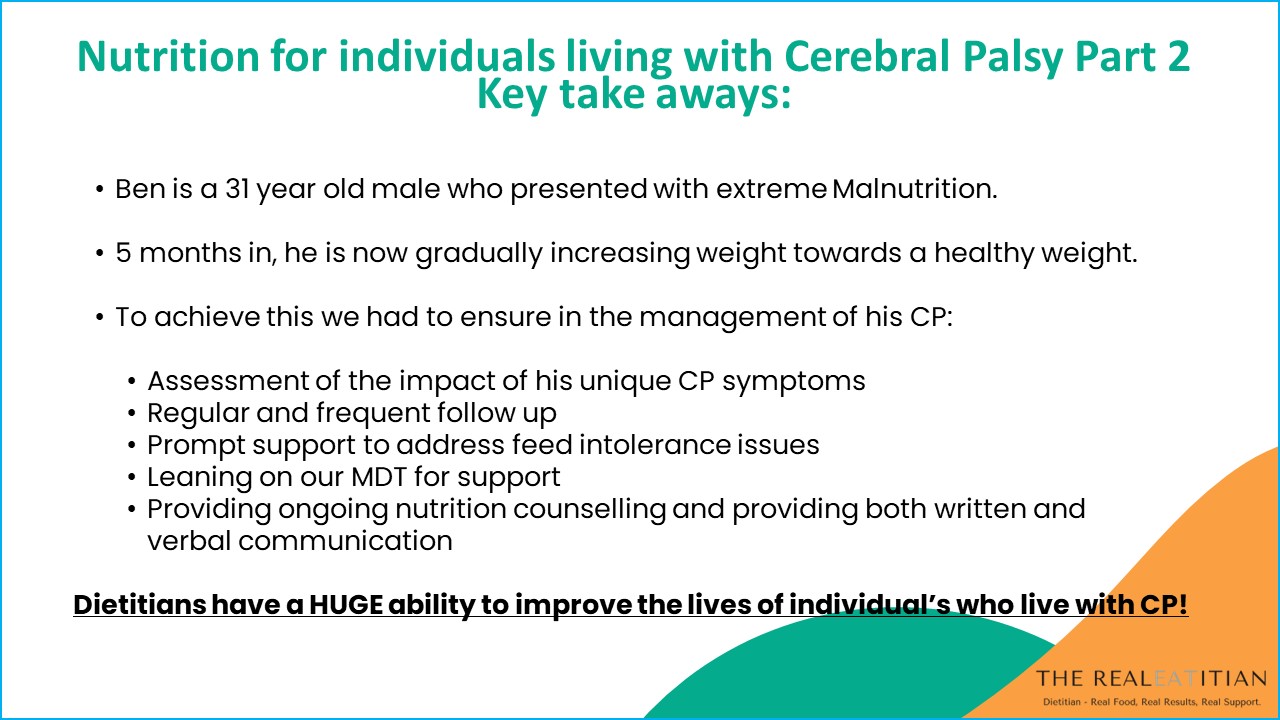Nutrition for people living with Cerebral Palsy Part 2 by Shannyn Thatcher, APD
 Anthea Talliopoulos, APD
Anthea Talliopoulos, APD
The nutrition management of individuals living with Cerebral Palsy can be complex as individuals may present with varying symptoms which can affect feeding, posture, and communication at mealtimes. In this scenario, NDIS and disability dietitian Shannyn Thatcher explains the nutritional management of Cerebral Palsy through discussing a patient on a partial oral and partial tube fed diet. In this case, the patient presented with extreme malnutrition, with an 11% unintentional low of weight across 6 months and a BMI of 14.5. This was related to increased energy requirements associated with low muscle tone, involuntary muscle movements, dystonia and associated gastrointestinal issues including reflux, vomiting and gastroparesis.
Shannyn explains the critical importance of advocating for patient care, especially amongst this vulnerable community, through being receptive to the needs of individuals, working closely with the family or carers, and communicating clearly with all health professionals involved. In this case, this involved educating the family on malnutrition and the significance of high energy foods and supplements, communicating with the hospital dietitian to best support the patient, and working alongside the speech pathologist and physiotherapist to optimise their function.
Through the introduction of small frequent meals, introducing dairy-based high energy and protein nutrition supplements, low volume feeds, food fortification and appropriate nutrition counselling and communication, the patient’s weight steadily increased, with a dramatically improved increase in function and involvement in social interactions and activities.
Overall, through thorough assessment, regular follow-up, prompt action to address feeding intolerance issues, clear communication with the multidisciplinary team, and ongoing thorough nutrition counselling, dietitians have a significant impact on improving the lives of individuals living with Cerebral Palsy.
Summary:
- The nutrition management of individuals living with Cerebral Palsy can be complex, although the management of symptoms and the importance of providing patient-centred care cannot be overlooked.
- Being receptive to the needs of individuals, working closely with the family or carers, and communicating clearly with all health professionals involved can ensure an optimal patient-centred plan is developed and implemented.
- Patients with Cerebral Palsy may present with a low body weight, although this should not be normalised or be overlooked, especially in the case of malnutrition.
- In addressing malnutrition in patients with Cerebral Palsy, tailoring the nutrition plan to the individual is key, such as in providing small frequent meals, encouraging food fortification, addressing any underlying food intolerances or unnecessary dietary restriction, providing food fortification, and changing the enteral nutrition feeding regimen (if applicable) can significantly increase the function and quality of life and function of individuals.

Shannyn Thatcher, APD has worked in the disability sector for three years. She is a passionate about supporting people with disabilities to lead more fulfilling, healthier, and happier lives through improved nutrition. Shannyn and her team at The Realeatitian, specialise in complex nutrition care, particularly for individuals living with cerebral palsy (CP), enteral feeding (including blended feeding), and assisting clients in overcoming oral food aversions. Shannyn is a remarkable advocate and resource when it comes to increasing the role of dietitians in the NDIS.